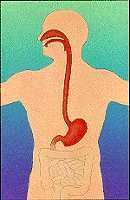Gastroesophageal reflux disease (GERD) is a common disorder which is characterized by the excessive backflow of stomach contents into the esophagus. Patients with GERD can experience a variety of symptoms including heartburn, regurgitation, acid indigestion and a bitter or sour taste in the mouth. They may also experience less typical symptoms such as a chronic sore throat, chronic cough, hoarseness, asthma and chest pain.
One of the long-term complications of GERD is a condition known as Barrett's esophagus. This disorder is characterized by the replacement of normal esophageal lining cells with intestinal cells. Because these intestinal cells may sometimes develop into cancer, patients with Barrett's esophagus should undergo periodic surveillance examinations of the esophagus.
There have been dramatic advances in the medical and surgical treatment of GERD in the last 30 years. The proton-pump inhibitors (Prilosec, Nexium, Prevacid, Aciphex, Protonix, Zegerid and Dexilant) are potent acid-suppressing drugs which have helped many patients who were previously refractory to medical therapy. Patients with GERD who are responding poorly to medication, or who wish to avoid taking drugs, may be candidates for a surgical fundoplication. In this procedure, a portion of the stomach is wrapped around the esophagus in order to tighten the lower esophageal sphincter (the muscle responsible for preventing reflux). This procedure is usually performed through a laparoscopic, minimally-invasive approach which dramatically reduces the discomfort and recuperative time of the operation.
Surgical implantation of a ring of metallic beads around the lower sphincter of the esophagus (LINX procedure) is a new technique that is effective in controlling reflux without some of the side effects of the traditional surgical fundoplication. A technique to perform a less invasive endoscopic fundoplication (TIF procedure) is also available. All patients considering surgery for reflux should undergo esophageal motility and ambulatory pH studies to determine whether the surgery is indicated and, if so, what type of operation should be performed.
